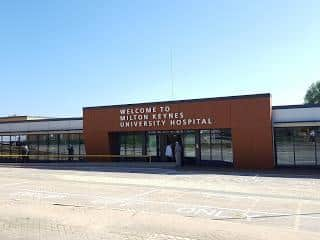41 tonnes of food waste thrown away at Milton Keynes Hospital last year
and live on Freeview channel 276
Official figures show 41.6 tonnes of food was thrown away at Milton Keynes University Hospital last year.
A report from National World, suggests the problem could be much bigger nationwide. Stating: "hospitals are only recording the food waste they segregate and send to be composted or broken down in an environmentally friendly way, there are fears the scale of food being dumped in landfills or incinerated could be far greater."
Advertisement
Hide AdAdvertisement
Hide AdNHS Digital’s annual infrastructure data collection shows NHS trusts in England reported sending 6,228 tonnes of food waste for anaerobic digestion or composting in 2019-20.


That’s 6.3 million kilograms – the equivalent of 75,000 average British men – although it was a significant drop on the 14,015 tonnes recorded in 2018-19. Unlike Milton Keynes, (112 out of 207) said they disposed of no food in this way – raising the possibility that far more is being thrown away with general waste.
In total, 69,175 admissions were logged at Milton Keynes Hospital totalling £5,028 worth of food waste in total for the NHS trust. Milton Keynes Hospital was below the national average when it came to food waste among the 95 hospitals that disclosed information. The average waste was 61 tonnes, the lowest reported waste just 0.1 tonnes – at the North Cumbria Integrated Care Trust, which was formed by a merger half way through the year.
The highest recorded amount was at the Royal Cornwall Hospitals Trust, which clocked up a massive 404 tonnes alone. That was followed by the South London and Maudsley Foundation Trust, with 241 tonnes, and the Frimley Health Foundation Trust in the Home Counties area, with 240 tonnes.
Advertisement
Hide AdAdvertisement
Hide AdWhen measured per patient admitted, the worst offender was the Rotherham, Doncaster and South Humber Foundation Trust, with 53 kgs per person (0.05 tonnes) – although no admitted patient data was available for the South London and Maudsley Trust.
When presented with these statistics a spokesperson for the Milton Keynes University Hospital NHS Foundation Trust said: "Milton Keynes University Hospital is committed to minimising food waste wherever possible across the organisation.
“All of our waste is taken to an anaerobic digestion plant where it is converted to biofertilizer or for use as heating or electricity. The Trust will also be launching a new and improved food service this summer in order to improve the quality, healthy eating options available to our patients which we think will further minimise food waste.
“As well as reducing food waste, the hospital is taking positive steps to reach an initial target of being carbon neutral. These steps include switching to renewable energies and installing solar panels so we are generating our own energy.”
Advertisement
Hide AdAdvertisement
Hide AdFood redistribution charity FareShare said millions of people in the UK struggle to get enough to eat and that feeding people is the most environmentally friendly thing to do with surplus food.
"As we’ve demonstrated throughout the pandemic, FareShare is ready at any time, to receive large scale offers of food, and through our networks of 30 regional centres and 11,000 charities across the UK, get it to people who need it most,” a spokesperson said to National World.
In 2017-18, NHS Digital asked trusts to report the weight of all unserved meals over a week-long period, to measure the amount of food that went straight in the bin. But the process was fraught with errors and the data unreliable, with some trusts multiplying their weekly figures by 52 to reach an annual figure, reporting the total weight three times – once each for breakfast, lunch and dinner – or reporting their trust-wide figure multiple times for every hospital site.
The audit also did not take account of food left uneaten on patients’ plates.